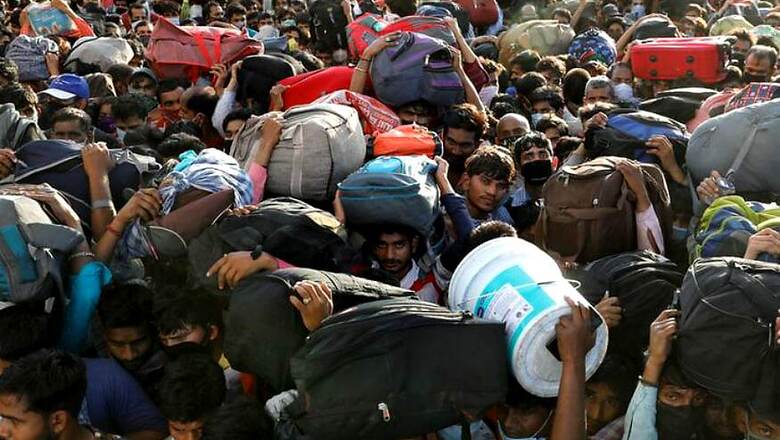
views
The 21-day lockdown to contain the spread of the novel coronavirus in India triggered a mass reverse migration of labourers from cities across the country. The state of paralysis and the shortage of labour may hamper the harvesting of winter crops, and will likely have a long-term effect on the country’s agriculture sector.
To ease the burden of farmers and migrant workers, the Centre exempted agricultural operations during the lockdown and announced a 1.7 lakh crore relief package. Amid speculation that the central government may extend the lockdown across the country beyond the initial 21-day period, there is uncertainty about what implications it could have on India’s ailing farm sector.
Eminent agriculture scientist and father of India's Green Revolution MS Swaminathan said that the country's rural economy is not adequately prepared for the pandemic, but added that the situation could be dealt with if institutional infrastructure is mobilised.
In an exclusive interview with News18, Swaminathan spoke about a range of issues including farm distress and food security amid the coronavirus crisis. Edited excerpts:
Reports of vegetables rotting in wholesale markets and farmers burning harvests during the lockdown have surfaced. Though farming and allied activities have been exempted, what impact will the 21-day lockdown have on the agriculture sector?
Perishable commodities like vegetables, flowers and fruits require, even under normal circumstances, cold storage facilities. Organisations like the National Horticulture Board exist for insulating farmers from damage to horticultural products. The 21-day lockdown period will certainly lead to some loss of both the quantity and quality of horticultural products. This, however, can be minimised by mobilising our existing infrastructure, including some help from the National Dairy Development Board, which maintains an effective cold chain for dairy products.
We witnessed a mass reverse migration of workers at a time when agricultural activity is at its peak. What bearing would this have on labour-intensive sectors like agriculture in the coming months and what can the government do to help farmers cope with this crisis?
The migration of workers will certainly lead to problems for farmers including timely harvesting, storage and marketing. Fortunately, to some extent, farm machinery is more readily available in the Punjab-Haryana and western Uttar Pradesh region. It is possible to minimise damage by the effective and efficient use of the available farm machinery and cold storage facilities.
The Centre unveiled a ₹1.7 lakh crore COVID-19 economic relief package, which includes direct cash transfers for farmers and a hike in MGNREGA wages. Do you think this is adequate to minimise the disruption caused by the coronavirus lockdown?
The magnitude of the problem arising from inadequate and timely availability of labour is great. The Centre’s economic relief package will certainly be of great help to attend to the food security of the families. The MGNREGA programme will be of great help to farmers, provided the definition of labour is enlarged to cover skilled work related to farmers and their farming activities. This is particularly important for women farmers and labour. Without this enlargement in definition, just a hike in wages may not be sufficient.
What should be done to ensure that the assistance reaches those who don’t have bank accounts?
Several steps are to be taken to ensure that there is a wider understanding of entitlements. The Krishi Vigyan Kendras and agricultural universities should be fully involved in ensuring that their entitlements reach farmers. In addition to them, Panchayati Raj Institutions should be fully involved. Media including mobile telephony, radio and TV should be fully utilised. This will help to spread knowledge of government programmes relevant to farmers.
Does India have adequate food stock to tide through the coronavirus crisis? With instances of hoarding and panic buying emerging, are there any concerns regarding food safety?
Fortunately we have adequate food reserves, so there is no immediate problem in providing the wheat/rice or other food commodities as assured in the National Food Security Act. This is a great accomplishment by Indian farmers who converted a ‘ship to mouth’ situation to a ‘right to food’ commitment. We, therefore, need to ensure that apart from the rabi harvest, farmers are also adequately supported in their kharif sowing, including with seeds and other inputs.
A recently concluded survey by Jan Sahas, a non-governmental organisation, has shown that if the lockdown were to be extended beyond the 21 days, many labourers will not be able to manage their household expenses for more than a week. What can be done to avoid deaths due to hunger and starvation?
If the lockdown is extended beyond the period envisaged now, the economically underprivileged sections of the society, particularly landless labour, will undergo suffering. It is important that the present public distribution system is further strengthened and its food basket widened particularly by including millets like ragi, bajra, etc, and pulses. In addition to the required calories, it is important to provide protein foods like pulses and oilseeds. Further, steps should be taken to avoid hidden hunger caused by the deficiency of micronutrients in the diet.
India's rural economy has been shrinking in the last few months. Against this backdrop, how prepared is rural India to deal with a pandemic and its economic fallout?
It is correct that the rural economy is suffering. In addition, there is a general problem of unemployment, both skilled and unskilled. We are at the moment not adequately prepared to deal with the pandemic. This, however, can be dealt with by mobilising our institutional infrastructure, starting with the panchayats (democratic institutions), and including institutions providing technological support, mainly for market-driven skills development. To summarise, India avoided what could have been one of the big famines in the 1960s with the help of technology and public policy. Today’s problems are not as daunting as in the 1960s. Through a combination of farmer’s cooperation, technological upgrading and favourable public policies in pricing and marketing, we can deal with the fallout of the pandemic. We owe to our farmers this enviable situation.
















Comments
0 comment